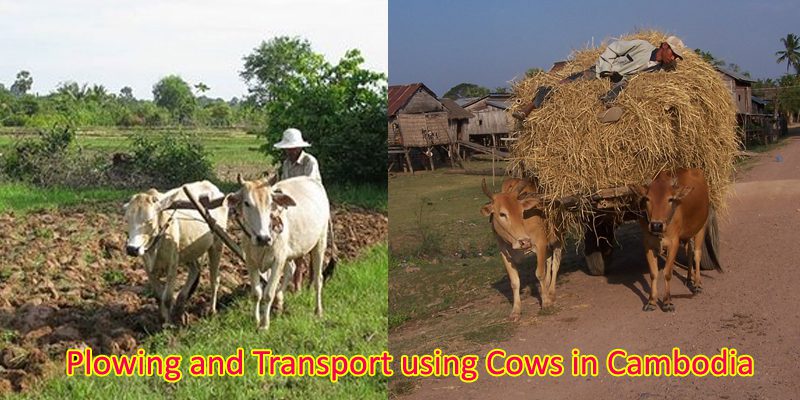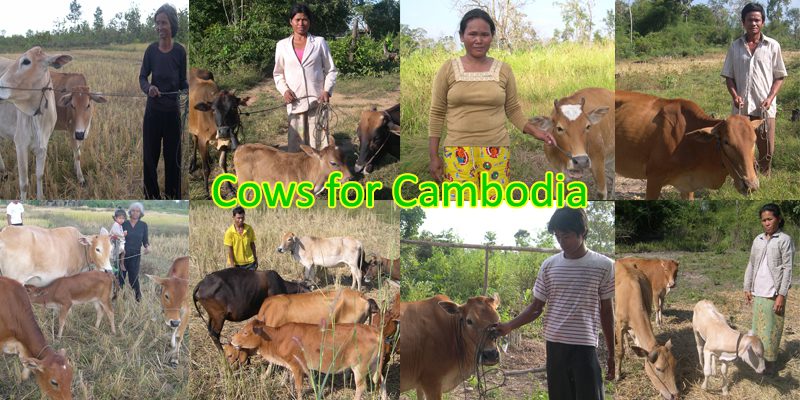About ten years ago I was thinking about how to help someone with a gift that would keep on giving. After much thought and prayer I came up with Cows for Cambodia. The basic idea is that by giving a farmer a cow, you give him an asset which is easy to care for and reproduces (the asset grows). Now, most of you, being able to read about Cows for Cambodia through a fast internet connection, are probably not rural based and have no idea about farming or animal husbandry.
In Cambodia, cows are essential for farming. We use cows to plow the fields and pull oxcarts. Because of the poverty in Cambodia, many times, the cow is the family’s most valuable asset as well. A good female cow costs approximately $250 in Cambodia.
Why we started “Cows for Cambodia”:
In Cambodia, most people (some 80%) are rice farmers. Rice farming, in Cambodia, is very labor intensive, and requires cows for plowing the fields. If a family does not own their own cows for plowing a field, they have to rent them from another family. The rental cost is usually 50% of the harvest. That means if you do not own your own cows, you automatically will lose 50% of your potential harvest. If we just gave a cow to a family though, they would likely sell it for cash. So we decided we would not sell the cows to the family, but we would loan it to them to use. The initial cow always remains the property of “Cows for Cambodia”. We would then pay the family an “annual fee” for taking care of our cow. That annual fee is the offspring for the year. Native cows in Cambodia are highly resistant to disease and have a calf every year like clockwork. Therefore, they get to use the cow free of charge, then they can keep their first calf for themselves. The second calf (second year) we keep as a “usage fee” for the use of our cow for two years. The third they keep, fourth we keep, and on and on. The asset keeps growing and the benefit to the people keeps growing.
The cow provides the family with a real asset. Cows can be bought and traded easily in Cambodian’s rural agriculture based economy. When emergency needs arise, they have an asset to help the family. On one occasion, one of the participants was in a motorcycle accident and was unconscious. The doctor refused treatment because he was afraid it was just a poor farmer who could not pay. The family informed the doctor that the injured man had a cow and so the doctor treated him, knowing he could pay with the cow. On another occasion, a lady had to have an emergency surgery and the doctor accepted the cow as payment.
Another widow, at one point, had an opportunity to buy 3 acres of land and she negotiated the price of one cow. That is a great deal for farmland. She had no money to be able to buy the land, but she did have a cow, so that gave her negotiating power. She then became a landowner for the first time in her life.
In the last nearly ten years we have bought about fifty cows. In that time, our assets have grown to several hundred cows. Many cows have been sold by the families and more and more families are being helped. We now have cows in five provinces.
How we operate “Cows for Cambodia”:
1) We find a poor family who is hardworking, trustworthy and wants to have a cow.
2) We find a good female cow. We like to find pregnant cows of approximately 3-4 years old.
3) The family cares for the cow. We have a veterinarian who can attend to any major medical needs of the cow.
4) Family keeps first calf.
5) We keep second calf and relocate to another family at approximately 2 years old. Male cows are used exclusively for plowing and transport needs.
Additional Benefit: There are no operating costs and no administrative overhead because we are able to keep some of the offspring as well. Therefore, there is no need to charge for any overhead expenses. 100% of donations for cows go directly to purchasing cows which are delivered free-of-charge to the family.
If you want to help a poor Cambodian family let us know. [email protected] Cows cost approximately $250.


STEVE … BEYOND THE PHYSICAL NEEDS, I AM SURE THAT YOU MINISTER TO THE FARMERS SPIRITUAL NEEDS.
Hey Jack, Yes, they are almost all church leaders families. Integrity and trust are crucial, so if we don’t have a strong relationship with the people, there is no way we could ever trust them with a cow. They would just kill it, overwork it, or sell it for the quick cash.
Mr. Hyde,
I would be interested in corresponding with you regarding the Cows for Cambodia project you operate and the project of the same name which our Rotary Club manages here in Central Texas. The director of our program is Ann Murrow. I am the current president of the club and both Ann and I have serious interest in broadening our scope in providing cows to Cambodia.
Because of the distance that separates us I assume that email is the best way to correspond.
I look forward to hearing from you soon.
Cordially,
Anna Johndrow
President, 2010-2011
Rotary Club of North Shore Lake Travis